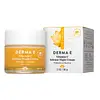What's inside
What's inside
 Key Ingredients
Key Ingredients

 Benefits
Benefits

 Concerns
Concerns

 Ingredients Side-by-side
Ingredients Side-by-side

Water
Skin ConditioningCaprylic/Capric Triglyceride
MaskingSodium Ascorbyl Phosphate
AntioxidantGlycerin
HumectantSodium Hyaluronate
HumectantCetyl Alcohol
EmollientEthylhexyl Palmitate
EmollientCetearyl Alcohol
EmollientCetearyl Glucoside
EmulsifyingCetyl Palmitate
EmollientSorbitan Palmitate
EmulsifyingSorbitan Oleate
EmulsifyingDiheptyl Succinate
EmollientCapryloyl Glycerin/Sebacic Acid Copolymer
Skin ConditioningPseudozyma Epicola/Nitrosomonas Europaea/Oil Ferment Filtrate
Skin ConditioningPrunus Armeniaca Kernel Oil
MaskingHelianthus Annuus Seed Oil
EmollientPrunus Amygdalus Dulcis Oil
Skin ConditioningEnterococcus Faecium/Saururus Chinensis Extract Ferment Filtrate
EmollientAspalathus Linearis Leaf Extract
Skin ConditioningGlycyrrhiza Glabra Root Extract
BleachingRosa Canina Fruit Oil
EmollientCamellia Sinensis Leaf Extract
AntimicrobialOlea Europaea Fruit Oil
MaskingRetinyl Palmitate
Skin ConditioningPanthenol
Skin ConditioningTocopheryl Acetate
AntioxidantXanthan Gum
EmulsifyingPotassium Sorbate
PreservativePhenoxyethanol
PreservativeEthylhexylglycerin
Skin ConditioningParfum
MaskingWater, Caprylic/Capric Triglyceride, Sodium Ascorbyl Phosphate, Glycerin, Sodium Hyaluronate, Cetyl Alcohol, Ethylhexyl Palmitate, Cetearyl Alcohol, Cetearyl Glucoside, Cetyl Palmitate, Sorbitan Palmitate, Sorbitan Oleate, Diheptyl Succinate, Capryloyl Glycerin/Sebacic Acid Copolymer, Pseudozyma Epicola/Nitrosomonas Europaea/Oil Ferment Filtrate, Prunus Armeniaca Kernel Oil, Helianthus Annuus Seed Oil, Prunus Amygdalus Dulcis Oil, Enterococcus Faecium/Saururus Chinensis Extract Ferment Filtrate, Aspalathus Linearis Leaf Extract, Glycyrrhiza Glabra Root Extract, Rosa Canina Fruit Oil, Camellia Sinensis Leaf Extract, Olea Europaea Fruit Oil, Retinyl Palmitate, Panthenol, Tocopheryl Acetate, Xanthan Gum, Potassium Sorbate, Phenoxyethanol, Ethylhexylglycerin, Parfum
Water
Skin ConditioningAloe Barbadensis Leaf Juice
Skin ConditioningSesamum Indicum Seed Oil
EmollientCetearyl Alcohol
EmollientGlycerin
HumectantCetyl Alcohol
EmollientCeteareth-20
CleansingRosa Canina Fruit Oil
EmollientPersea Gratissima Oil
Skin ConditioningPunica Granatum Seed Extract
Skin ConditioningTerminalia Ferdinandiana Fruit Extract
AntioxidantTheobroma Cacao Seed Butter
EmollientButyrospermum Parkii Butter
Skin ConditioningSimmondsia Chinensis Seed Oil
EmollientCitrus Tangerina Peel Oil
MaskingCitrus Nobilis Peel Oil
MaskingLavandula Angustifolia Oil
MaskingTocopherol
AntioxidantVanillin
MaskingVanilla Planifolia Fruit Extract
Skin ConditioningPhenoxyethanol
PreservativeBenzyl Alcohol
PerfumingLinalool
PerfumingLimonene
PerfumingWater, Aloe Barbadensis Leaf Juice, Sesamum Indicum Seed Oil, Cetearyl Alcohol, Glycerin, Cetyl Alcohol, Ceteareth-20, Rosa Canina Fruit Oil, Persea Gratissima Oil, Punica Granatum Seed Extract, Terminalia Ferdinandiana Fruit Extract, Theobroma Cacao Seed Butter, Butyrospermum Parkii Butter, Simmondsia Chinensis Seed Oil, Citrus Tangerina Peel Oil, Citrus Nobilis Peel Oil, Lavandula Angustifolia Oil, Tocopherol, Vanillin, Vanilla Planifolia Fruit Extract, Phenoxyethanol, Benzyl Alcohol, Linalool, Limonene
Ingredients Explained
These ingredients are found in both products.
Ingredients higher up in an ingredient list are typically present in a larger amount.
Cetearyl alcohol is a mixture of two fatty alcohols: cetyl alcohol and stearyl alcohol. It is mainly used as an emulsifier. Emulsifiers help prevent the separation of oils and products. Due to its composition, it can also be used to thicken a product or help create foam.
Cetearyl alcohol is an emollient. Emollients help soothe and hydrate the skin by trapping moisture.
Studies show Cetearyl alcohol is non-toxic and non-irritating. The FDA allows products labeled "alcohol-free" to have fatty alcohols.
This ingredient is usually derived from plant oils such as palm, vegetable, or coconut oils. There is debate on whether this ingredient will cause acne.
Due to the fatty acid base, this ingredient may not be Malassezia folliculitis safe.
Learn more about Cetearyl AlcoholCetyl Alcohol is a fatty alcohol. Fatty Alcohols are most often used as an emollient or to thicken a product.
Its main roles are:
Though it has "alcohol" in the name, it is not related to denatured alcohol or ethyl alcohol.
The FDA allows products labeled "alcohol-free" to have fatty alcohols.
Learn more about Cetyl AlcoholGlycerin is already naturally found in your skin. It helps moisturize and protect your skin.
A study from 2016 found glycerin to be more effective as a humectant than AHAs and hyaluronic acid.
As a humectant, it helps the skin stay hydrated by pulling moisture to your skin. The low molecular weight of glycerin allows it to pull moisture into the deeper layers of your skin.
Hydrated skin improves your skin barrier; Your skin barrier helps protect against irritants and bacteria.
Glycerin has also been found to have antimicrobial and antiviral properties. Due to these properties, glycerin is often used in wound and burn treatments.
In cosmetics, glycerin is usually derived from plants such as soybean or palm. However, it can also be sourced from animals, such as tallow or animal fat.
This ingredient is organic, colorless, odorless, and non-toxic.
Glycerin is the name for this ingredient in American English. British English uses Glycerol/Glycerine.
Learn more about GlycerinPhenoxyethanol is a preservative that has germicide, antimicrobial, and aromatic properties. Studies show that phenoxyethanol can prevent microbial growth. By itself, it has a scent that is similar to that of a rose.
It's often used in formulations along with Caprylyl Glycol to preserve the shelf life of products.
Rosehip Oil is a non-fragrant plant oil. Rosehips are a fruit from a rose bush and are edible. This oil has skin conditioning and hydrating properties.
Rosehip contains Vitamin C, Vitamin E, fatty acids and linolenic acids. These nourish your skin barrier. Having hydrated skin may help reduce the appearance of fine-lines and wrinkles.
Another great component of Rosehip Oil is Vitamin A, or retinol. Vitamin A encourages your skin to create more collagen.
Rosehip oil may help with reducing pigmentation. The lycopene and beta-carotene have skin-lightening properties. However, more studies are needed to confirm this.
Learn more about Rosa Canina Fruit OilWater. It's the most common cosmetic ingredient of all. You'll usually see it at the top of ingredient lists, meaning that it makes up the largest part of the product.
So why is it so popular? Water most often acts as a solvent - this means that it helps dissolve other ingredients into the formulation.
You'll also recognize water as that liquid we all need to stay alive. If you see this, drink a glass of water. Stay hydrated!
Learn more about Water